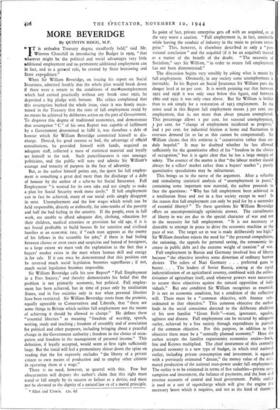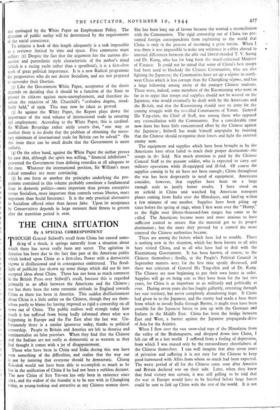MORE BEVERIDGE
By QUINTIN HOGG, M.P.
uTT is orthodox Treasury dogma steadfastly held," said Mr.
X Winston Churchill in introducing the Budget in 1929, " that whatever might be the political and social advantages very little additional employment and no permanent additional employment can in fact, and as a general rule, be created by State borrowing and State expenditure." When Sir William Beveridge, on issuing his report on Social Insurance, admitted frankly that the whole plan would break down if there were a return to the conditions of mas.tunemployment which had existed practically without any break since 1920, he deposited a big pledge with fortune. His critics complained that this assumption burked the whole issue, since it was firmly main- tained in the Treasury that the state of full employment could by no means be achieved by deliberate action on the part of Government.' To disprove this dogma of traditional economics, and demonstrate that assumption " C" of his own Report was capable of fulfilment by a Government determined to fulfil it, was therefore a debt of honour which Sir William Beveridge committed himself to dis- charge. Denied, for good reasons or bad, the advantage of official consultations, he provided himself with funds, acquired an adequate staff, collected a mass of statistical material and loyally set himself to the task. Such punctiliousness is rare amongst politicians, and the public will note and admire Sir William's courage and tenacity of purpose in the face of adversity.
But, as the author himself points out, the quest for full employ- ment is something a great deal more than the discharge of a debt of honour by the author of a scheme for Social Insurance. Full Employment " is wanted for its own sake and not simply to make a plan for Social Security work more easily." If full employment can in fact be achieved, many of our social evils simply disappear in mist. Unemployment and the low wages which result can be held responsible, directly or indirectly, for nine-tenths of the poverty and half the bad feeling in the country. If the people, even in full work, are unable to afford adequate diet, clothing, educaticin for their children, medical attention or provision for old age, if it is not found profitable to build houses fit for sensitive and civilised families at an economic rate, if teach man appears as the enemy of his fellows in the scramble for jobs," if there is bad feeling between classes or even races and suspicion and hatred of foreigners, to a large extent we must seek the explanation in the fact that a buyers' market exists in the mart where human skill and energy is for sale. If it can once be demonstrated that this position can be reversed much social legislation becomes superfluous ; if not, much social legislation becohies impossible.
Sir William Beveridge calls his new Report* " Full Employment in a Free Society," and thereby demonstrates his belief that the problem is not primarily economic, but political. Full employ- ment has been achieved, but in time of peace only by totalitarian States, and in free societies only in war when personal liberties have been restricted. Sir William Beveridge starts from the premise, equally agreeable to Conservatives and Liberals, that " there are some things in Britain which neither full employment nor the means of achieving it should be allowed to change." He defines these "essential liberties " as meaning " freedom of worship, speech, writing, study and teaching ; freedom of assembly and of association for political and other purposes, including bringing about a peaceful change in the Government authority ; freedom in the choice of occu- pation and freedom in the management of personal income." This definition, if loyally accepted, would seem at first sight sufficiently large. But the timid will feel a premonitory shiver down the spine on reading that the list expressly excludes " the liberty of a private citizen to own means of production and to employ other citizens • in operating them at a wage."
There is no need, however, to quarrel with this. Few but obscurantists will dispute the author's claim that this right must stand or fall simply by its success or failure as a device, and must not be elevated to the dignity of a natural law or of a moral principle.
* Allen and Unwin. 12s. 6d
In point of fact, private enterprise gets off with an acquittal, or at the very worst a caution. " Full employment is, in fact, attainable while leaving the conduct of industry in the main to private enter- prise." This, however, is elsewhere described as only a " pro- visional conclusion " and the acquittal (if it be an acquittal) treated as a matter of the benefit of the doubt. "The necessity of Socialism," says Sir William, " in order to secure full employment has not been demonstrated."
The discussion begins very sensibly by asking what is meant by full employment. Obviously, in any society some unemployment is inevitable. In his Report on Social Insurance Sir William puts the danger level at to per cent. It is worth pointing out that between 1922 and 1938 it was only once below this figure, and between i86o and 1920 it was only once above. But Sir William is bolder than to ask simply for a restoration of 1913 employment. In the sense used in this Report full employment means 3 per cent. un- employment, that is, not more than about 500,000 unemployed. This percentage allows 1 per cent. for seasonal unemployment, per cent. for " change of employment incidental to progress," Ind r per cent. for industrial friction at home and fluctuation in overseas demand (in so far as this cannot be compensated). Sir William claims that this estimate is " conservative rather than un- duly hopeful." It may be doubted whether he has allowed sufficiently for the quantitative effect of his "freedom in the choice of occupation," but it is qpite clear that he has a large margin of safety. The essence of the matter is that " the labour market should always be a sellers' market rather than a buyers' market " ; purely quantitative speculations may be infructuous.
This brings us to the nerve of the argument. After a valuable and stimulating statistical analysis of " unemployment in peace," containing some important new material, the author proceeds to face the questions: " Why has full employment been achieved in a totalitarian State and not in a free society except in war? Is the reason that full employment can only be paid for by a surrender of essential liberty? " To' these questions Sir William Beveridge offers an uncompromisingly optimistic answer. The curtailments of liberty in war are due to the special character of war and not to the necessity for full employment. " It is not necessary or desirable to attempt in peace to drive the economic machine at the pace of war. The target set in war is made deliberately too high." Sir William therefore rejects the need for " the personal compulsions, the rationing, the appeals for personal saving, the astronomic in- crease in public debt ani the extreme weight of taxation" of war.
Full employment in Russia and Germany involved loss of liberty because " the objective involves sonic distortion of ordinary human desires. The rulers of Nazi Germany . . . preferred guns to butter. . . . The leaders of Soviet Russia, aiming at the rapid industrialisation of an agricultural country, combined with the collec- tivisation of agriculture itself, used whatever powers were necessary to secure these objectives against the natural opposition of indi- viduals." But one condition Sir William recognises as essential. It is not an economic condition, but a condition of the collective will. There must be a " common objective, with finance sub- ordinated to that objective." This common objective the author finds in the social conscience directed to the deliberate abolition of his now familiar " Grant Evils "—want, ignorance, squalor, ugliness and disease. Full employment can be secured by adequate outlay, achieved by a free society through expenditure in pursuit of the common objective. For this purpose, in addition to the objective there must be a " centrally planned economy." Here the author accepts the familiar expansionist economics entire—hook, line and Keynes multiplied. The chief instrument of this centrally planned economy is a new type of budget, in which total national outlay, including private consumption and investment, is equated with a previously estimated "datum," the money value of the esti- mated production of the national man-power under full employment. The outlay is to be estimated in terms of five valuables—private con- sumption and investment, the balance of payments, and the loan and revenue accounts of central and local government. Public outlay is used as a sort of supercharge which will give the engine tt e necessary boost which it requires, and not as the kind- of thennc-
stat envisaged by the White Paper on Employment Policy. The direction of public outlay will be determined by the requirements of the social conscience.
To criticise a book of this length adequately is a task impossible to a reviewer limited by time and space. Five comments must suffice: (i) Despite the fact that the argument has the curious dis- cursive and parenthetic style characteristic of the author's mind (which is a racing yacht rather than a speedboat), it is a first-class work of great political importance. It is a new Radical programme for progressives who do not desire Socialism, and are not prepared to surrender their liberties.
(2) Like the Government White Paper, acceptance of the thesis depends on deciding that it should be a function of the State to protect its citizens against mass-unemployment, and therefore in- volves the rejection of Mr. Churchill's "orthodox dogma, stead- fastly held," of 1929. This may now be taken as proved.
(3) As against the White Paper, the Report plays down the importance of the total volume of international trade in ensuring full employment. According to the White Paper, this is cardinal. Sir William - Beveridge rather airily asserts that, " one way or another there is no doubt that the problem of obtaining the neces- sary minimum of international trade for Britain can be solved." On this issue there can be small doubt that the Government is more lealistic.
(4) On the other hand, against the White Paper the author proves his case that, although the spirit was willing, " financial inhibitions" prevented the Government from defining remedies at all adequate to the cure. Whatever the international position, Sir William's more radical remedies are more convincing.
(5) In one form or another the principles underlying the pro- gramme contained in this volume probably constitute a fundamental issue in domestic politics—more important than private enterprise versus Socialism, more important than controls versus libertes, more important than Social Insurance. It is the only practical alternative to Socialism offered other than laissez faire. Upon its acceptance by Conservatives depends in large measure their fitness to govern after the transition period is over.



























 Previous page
Previous page